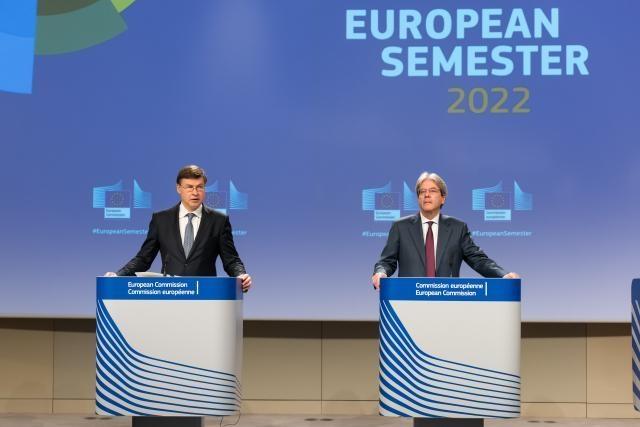
The European Semester and the Recovery and Resilience Facility (RRF) - at the heart of NextGenerationEU - provide for robust frameworks to ensure effective policy coordination and to address the current challenges. The RRF will continue to drive Member States’ reform and investment agendas for years to come. This year, the country-specific recommendations include recommendations for reducing the dependency on fossil fuels through reforms and investments, in line with the REPowerEU priorities and the European Green Deal.
In light of the new economic environment created by Russia’s war of aggression against Ukraine, the Commission considers that the conditions to maintain the general escape clause of the Stability and Growth Pact in 2023 and to deactivate it as of 2024. The Commission will provide orientations on possible changes to the economic governance framework after the summer break and well in time for 2023.
As part of the package, the Commission has also adopted a report to assess Member States’ compliance with the deficit and debt criteria of the Treaty under Article 126(3) of the Treaty on the Functioning of the EU (TFEU) for 18 EU Member States.
The Commission has also adopted a proposal for Employment Guidelines for 2022, the fourteenth enhanced surveillance report for Greece and post-programme surveillance reports for Ireland, Spain, Cyprus, and Portugal.
Paolo Gentiloni, Commissioner for Economy, said:
“Ever since the first weeks of the pandemic more than two years ago, the EU and national governments have delivered strong and coherent policy support to our economies, helping to sustain a swift recovery. Today, our common priorities are investment and reform. This is reflected in the recommendations presented today, with their clear focus on the implementation of national recovery and resilience plans and on the energy transition. Fiscal policies should continue to transition from the universal support provided during the pandemic to more targeted measures. As we navigate the new period of turbulence caused by Russia's invasion of Ukraine, governments must also have the flexibility to adapt their policies to unpredictable developments."
Country specific recommendations for Ireland
The country specific recommendations for Ireland recommend that action be taken in 2022 and 2023 to :
- In 2023, ensure that the growth of nationally-financed current expenditure is in line with an overall neutral policy stance, taking into account continued temporary and targeted support to households and firms most vulnerable to energy price hikes and to people fleeing Ukraine. Stand ready to adjust current spending to the evolving situation. Expand public investment for the green and digital transition and for energy security, including by making use of the RRF, RePowerEU and other EU funds. For the period beyond 2023, pursue a fiscal policy aimed at achieving prudent medium-term fiscal positions. Address the expected increase in age-related pension expenditure by ensuring the fiscal sustainability of the state pension system.
- Proceed with the implementation of its recovery and resilience plan, in line with the milestones and targets included in the Council Implementing Decision of 8 September 2021. Submit the 2021-2027 cohesion policy programming documents with a view to finalising their negotiations with the Commission and subsequently starting their implementation.
- Focus efforts on boosting the circular economy. In particular, develop both infrastructure and policies to prevent waste and increase reused and recycled content, and develop a more effective system for the separate collection of recyclable waste, including biodegradable waste. Promote safer and cleaner waste water circuits.
- Reduce overall reliance on fossil fuels. Accelerate the deployment of renewable energy, in particular offshore wind, including by introducing reforms to improve the efficiency of the planning and permit system, particularly by reducing the duration of procedures. Upgrade energy infrastructure, including for storage. Ensure the fast implementation of deep building retrofits. Accelerate the electrification of transport, including by installing charging facilities.
According to the 2022 European Semester country report for Ireland, the Irish economy weathered the pandemic well and Ireland was the only EU country to avoid a recession during the pandemic. However, while the large multinationals saw considerable business growth during the pandemic and their exports were a driving force behind Ireland's economic expansion in 2020 and 2021, domestic companies did not match their performance. There were also strong disparities between regions hosting multinationals and regions dominated by Irish-owned SMEs.
For more information
Questions and answers on the European Semester 2022 Spring Package
Communication on the main elements of the European Semester Spring Package
Country reports for the 27 Member States
Country-specific recommendations (CSRs) for the 27 Member States
In-depth reviews for 12 Member States
Report under Article 126(3) of the Treaty on the Functioning of the EU
Opinions on the draft budgetary plans of Germany and Portugal
Fourteenth enhanced surveillance report for Greece
Post-programme surveillance reports for Cyprus, Ireland, Spain and Portugal
Proposal for a Council Decision on guidelines for the employment policies of the Member States
Monitoring report on progress towards the UN Sustainable Development Goals in an EU context.
Details
- Publication date
- 23 May 2022
- Author
- Representation in Ireland
